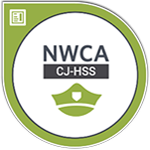PURPOSE
The Homeland Security credential documents the essential knowledge base for those who work in homeland security and who are tasked with anticipating, preparing for, preventing, and reacting to pandemics, natural disasters, emergencies, and terrorism.
AUDIENCE
This credential is appropriate for professionals who work in a variety of homeland security jobs in the State, Federal, and local governments as well as in private companies and nonprofit organizations. Examples of these jobs include air marshals, program analysts, Coast Guard members, immigration workers, customs and border protection workers, FEMA workers, law enforcement specialists, information analysis professionals, intelligence specialists, security specialists, telecommunication specialists, attorneys and auditors, scientists, human resource specialists, and many others.
JOB/CAREER REQUIREMENTS
This credential demonstrates a working knowledge of the how the Department of Homeland Security approaches the U.S. security and policy as well as related legislation. They must know how to define and recognize terrorism, how intelligence is used, the U.S. critical infrastructure and key resources, the tools and technologies used in cyberterrorism protection and prevention, and unique approaches to protection for transportation systems and public health. Additionally, they must understand the differences in protection approaches to natural disasters, technological disasters, emergencies and catastrophic events. Homeland Security workers should understand the various agencies and systems involved in protecting the country including FEMA, incident command systems, the National Disaster Medical System, and various communication systems. Finally, security workers must understand the various ethical considerations involved in protecting the country.
HOMELAND SECURITY WORKPLACE TASKS:
- Apply the basic policies, approaches, and legislation related to protecting the country
- Apply an understanding of the purpose and organization of the Department of Homeland Security
- Apply an understanding of terrorism in its various forms
- Apply an understanding of intelligence and how it is used in protecting the country
- Apply an understanding of the critical infrastructure and key resources of the country and how they must are protected
- Apply an understanding of how cyberterrorism is identified and combated
- Apply an understanding of how transportation services are protected
- Apply an understanding of how the public health is protected
- Apply an understanding of the varying responses to natural hazards, technological disasters, emergencies, and catastrophic
- Apply an understanding of the purpose, jurisdiction, and responsibilities of FEMA
- Apply an understanding of the purpose of incident command systems and how they can improve emergency management
- Apply an understanding of the National Disaster Medical System and how it is used in an emergency response • Apply an understanding of communication systems and how they can be used in emergency planning, preparation, and responses
- Apply an understanding of the ethical considerations involved in homeland security
- Apply an understanding of the various positions and roles involved in security and protection in medical facilities, businesses, public utility workers emergency responders, social service providers, and homeland security"
EXAM STRUCTURE OVERVIEW
Number of Questions in Exam: 50
Total Time: 50 minutes
Overall Passing Score: 70%
(All sections require an individual passing score of 70%)

